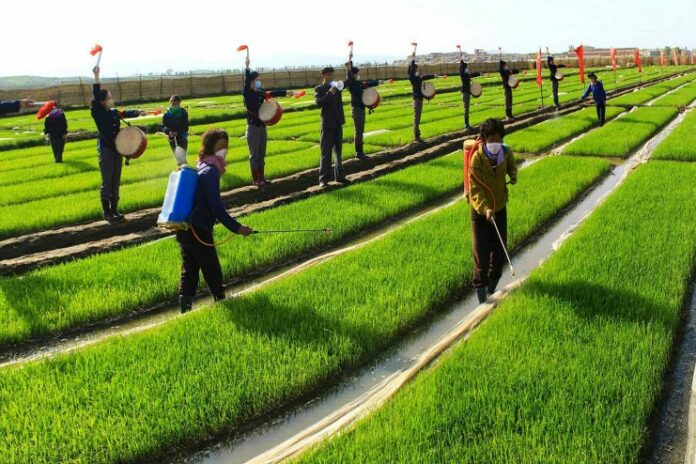
Even though North Korea claims that it completed rice transplanting nationwide, work reportedly remains incomplete in many areas.
A source in South Pyongan Province told Daily NK on Wednesday that not even 60% of the “basic acreage” nationwide has been seeded.
“We could not carry out proper rice transplanting because of labor shortages due to the spread of COVID-19, shortages of machinery and agricultural chemicals, and drought,” he said.
Basic acreage refers to total acreage minus acreage for wheat and barley, double cropping and potatoes. It accounts for about 60% of the total acreage. Farmers in North Korea usually seed total acreage by the end of June. However, considering that the source says farmers have been unable to complete seeding of even basic acreage, it is highly likely that seeding has run into trouble more generally.
Daily NK reported that the country was running into trouble preparing for rice transplanting early last month with farms suffering shortages of supplies and machinery, and with the authorities having a hard time mobilizing labor.
The source said seed beds developed late due to “unprecedentedly difficult conditions,” and the start of rice transplanting was delayed.
“With even mobilized labor insufficient due to the COVID-19 pandemic, rice transplanting was delayed in all regions,” he said.
“Pyongwon, Mundok and Sukchon County — which produce more than 150,000 tons of grain a year — were the latest to begin rice transplanting this year in South Pyongan Province,” the source continued, adding, “On the day rice transplanting began, the workstation was empty, and the fields were unflooded because reservoirs had run dry due to the drought.”
Even satellite photos demonstrate that rice transplanting remains incomplete. Analysis of images of five major grain-producing regions and plains in North Korea showed that progress in rice transplanting was significantly behind that of last year.
That North Korean authorities rushed to announce the completion of rice transplanting, despite the situation being what it is, raises questions.
One North Korean defector who is familiar with North Korea’s agricultural sector suggested that North Korea said what it did “because the country — suffering due to economic difficulties and the spread of COVID-19 — was worried of domestic turmoil if it said it could even finish rice transplanting.
“People worry that if there’s a problem with rice transplanting, there could be problems in the harvest, leading to food shortages,” he added.
In other words, North Korean authorities likely lied about completing the rice transplanting because they were worried about rattling public sentiment.
Moreover, the defector said cadres in the agricultural sector face censure or, in serious cases, sacking if they fail to finish rice transplanting by the target date.
“Because of this, front-line cadres often send false reports to the authorities,” he said.
Quoting a source, Daily NK recently reported that officials had sent false reports on rice transplanting due to concerns of punishment.
Translated by David Black. Edited by Robert Lauler.
Please direct any comments or questions about this article to dailynkenglish@uni-media.net.
















